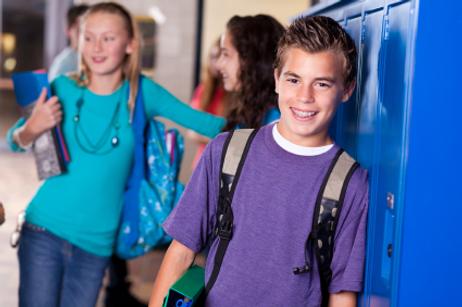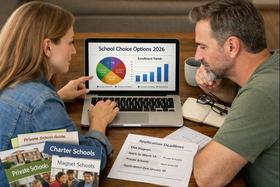As younger adolescents move from the smaller middle school setting to the larger and more diverse high school environment, many kids experience anxiety and worry about the shifting dynamics and expectations. According to researchers Mizelle, Phelan, Yu, and Davidson, “Young adolescents […] are concerned about being picked on and teased by older students, having harder work, making lower grades, and getting lost in a larger, unfamiliar school.”
Common Struggles for New 9th-Grade Students
As they move to the high school setting, many 9th-grade students commonly experience a significant decline in both grades and attendance. This often occurs as a result of the new social opportunities and the greater option of choices for young students, in addition to the pressures of fitting in and finding their own comfortable peer groups.
In addition, according to ERIC Digest, these students tend to “view themselves more negatively and experience an increased need for friendships.” This is a relatively universal experience for young adolescents, as studies reveal this to be true for even honors or “high achieving” students.
How Can You Help Keep Your Child on Track?
Transition Programs
To help young students transition to the new school setting, recent studies reveal that students who take part in middle school “transition programs” are able to move through the shifting school settings with far less of a struggle.
As Eric Digest explains, “Research has found […] that when middle school students took part in a high school transition program with several diverse articulation activities, fewer students were retained in the transition grade.” Paired with this, “middle school principals indicated that they expected fewer of their students to drop out before graduation when the school provided supportive advisory group activities or responsive remediation programs.”
What is a Transition Program?
A transition program is a collaborative attempt on behalf of middle schools to prepare their students for high school. As The National Middle School Association (NMSA) explains,
“Successful transition programs must involve collaboration between eighth and ninth grade buildings/personnel […] schools should communicate to identify […] the distinctive features of academic, social, and organizational logistics and philosophies in middle school and high school.”
With this approach, many middle schools are collaborating with the corresponding 9th-grade teachers to ensure that the 8th-grade instruction establishes the appropriate scaffold and foundation for 9th-grade information and experiences.
As NMSA further explains, “Transition programs that consistently ask students to reflect on and to experience the complexities and nuances of the distinctive features of high school will have greater impact than isolated information sessions.” In asking students to individually reflect and process the potential changes they will encounter from one school to the next, students can anticipate and uniquely comprehend the impending shifts and transitions.
What Information Should a Successful Transition Program Provide?
Not only should transition programs prompt students to reflect on the upcoming high school experience, but NMSA also asserts that successful transition programs should “address the information gap by providing students and families with a wealth of information about the academic, social, and organizational similarities and differences between middle school and high school.”
While each middle school is unique in its practices, some successful programs provide 8th graders with an opportunity to visit the high school and meet new students before the beginning of the school year; some schools invite high school teachers to speak with 8th graders prior to entering high school, while other schools provide students with a mentoring program so that 8th graders have a high school student who can help show them around, provide advice and tips.
Ultimately, as NMSA supports, since the high school dropout rates are significantly lower in districts and schools with successful transition programs, school communities and leaders should ensure that both young adolescents and parents are provided with the appropriate tools and information to ensure individual care for each student. NMSA states that all transition programs should address issues of “curriculum (e.g., academic rigor of courses); facilities (e.g., location of classrooms, restrooms); and safety and discipline (e.g., rules and discipline code); and provide accurate information (e.g., organization and logistics).”
Does Your Child’s School Have a Transition Program?
As each public and private school has its own unique curriculum and academic requirements, not all schools have successfully implemented transition programs. The best approach for parents is to speak with the teachers, department chairs, and principals at the middle school level. In establishing communication, parents can be informed about the preparedness of their children for high school and can also strive to become involved in any developing or already established program.
What to do if Your Child’s School Does Not Support the Transition?
As transition programs are highly effective for young teens, parents can look into alternative transition opportunities if a school’s current program is lacking in support or has not yet been implemented.
There are many summer opportunities and programs for students to learn more about transition strategies, such as Anne Bracken’s program, known as “The Possibility Project.” As Bracken explains, this project “offers group and individual expressive arts coaching programs for adults in life transitions as well as enrichment and academic programs for adolescents.” Bracken’s 15 years of educational work and therapy have provided her with the skills to lead interactive workshops for adults and teens, specifically one focusing on moving towards high school, called: “Stepping into Success: Successful Transition to Middle and High School.”
Bracken is just one of the many educators providing transition workshops nationwide. Workshops are also often set up as overnight camps or day camps for young adolescents, enabling them to branch out of their comfort zone before entering the new high school atmosphere. Parents can find out about alternative transition opportunities by speaking with middle school counselors and advisors or by also searching for local summer camps, seminars, and workshops in the area.
Questions? Contact us on Facebook. @publicschoolreview















